- Clone
- 3G7A02 (See other available formats)
- Regulatory Status
- RUO
- Other Names
- TNFRSF1B, p75, p75TNFR, TNFR2, TNFR80, TBPII
- Isotype
- Rat IgG2a, κ
- Ave. Rating
- Submit a Review
- Product Citations
- publications
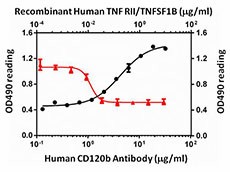
-

TNF-RII/TNFRSF1B inhibition of TNF-α-induced cytotoxicity and neutralization by human CD120b antibody. Recombinant Human sTNF-RII (Cat. No. 591602) inhibits Recombinant Human TNF-α (Cat. No. 570102) induced cytotoxicity in the L929 mouse fibroblast cell line in a dose-dependent manner (black line). Inhibition of Recombinant Human TNF-α (0.25 ng/mL) activity elicited by Recombinant Human sTNF-RII (0.4 µg/mL) is neutralized by increasing concentrations of human CD120b monoclonal antibody (red line) in the presence of the metabolic inhibitor actinomycin D (1 µg/ml). The ED50 is 0.5-1.5 µg/ml.
CD120b, also known as TNFRII or TNFRSF1B, belongs to the TNF receptor superfamily and can interact with ligands TNF-α and TNF-β (also known as LT-α). It is a 75 kD type I transmembrane protein expressed on lymphocytes, monocytes, and granulocytes. When present in a heterocomplex with CD120a, it induces the recruitment of anti-apoptotic molecules, c-IAP1 and c-IAP2 that possess E3 ubiquitin ligase activity. Mutations in CD120b are associated with TNF-associated periodic syndrome (TRAPS) or periodic fever syndrome.
Product DetailsProduct Details
- Verified Reactivity
- Human
- Antibody Type
- Monoclonal
- Host Species
- Rat
- Immunogen
- Partial CD120b recombinant protein expressed in 293E cells (22-211aa).
- Formulation
- 0.2 µm filtered in phosphate-buffered solution, pH 7.2, containing no preservative.
- Endotoxin Level
- Less than 0.01 EU/µg of the protein (< 0.001 ng/µg of the protein) as determined by the LAL test.
- Preparation
- The Ultra-LEAF™ (Low Endotoxin, Azide-Free) antibody was purified by affinity chromatography.
- Concentration
- The antibody is bottled at the concentration indicated on the vial, typically between 2 mg/mL and 3 mg/mL. Older lots may have also been bottled at 1 mg/mL. To obtain lot-specific concentration and expiration, please enter the lot number in our Certificate of Analysis online tool.
- Storage & Handling
- The antibody solution should be stored undiluted between 2°C and 8°C. This Ultra-LEAF™ solution contains no preservative; handle under aseptic conditions.
- Application
-
FC, Neut - Quality tested
- Recommended Usage
-
Each lot of this antibody is quality control tested by neutralization. It is recommended that the reagent be titrated for optimal performance for each application.
- Product Citations
-
- RRID
-
AB_2563224 (BioLegend Cat. No. 358408)
Antigen Details
- Structure
- 75 kD, type I transmembrane protein, member of the TNF-receptor superfamily, forms a heterocomplex with TNFRI
- Distribution
-
Expressed on cells of hematopoietic lineage including monocytes, lymphocytes, and granulocytes
- Function
- When complexed with TNFRI, recruits anti-apoptotic molecules c-IAP1 and c-IAP2 that possess ubiquitin ligase activity; cysteine rich extracellular region
- Interaction
- Interacts with TTRAP and TRAF2
- Ligand/Receptor
- TNF-α and TNF-β (LT-α)
- Cell Type
- Granulocytes, Lymphocytes, Monocytes
- Biology Area
- Cell Biology, Immunology, Innate Immunity, Neuroinflammation, Neuroscience, Transcription Factors
- Molecular Family
- CD Molecules
- Antigen References
-
1. Andrews JS, et al. 1990. J. Immunol. 144:2582.
2. Nophar Y, et al. 1990. EMBO J. 9:3269.
3. Kohno T, et al. 1990. Proc. Natl. Acad. Sci. USA 87:8331.
4. Tartaglia LA, et al. 1991. Proc. Natl. Acad. Sci. USA 88:9292.
5. Hijdra D, et al. 2012. J. Inflamm. (Lond). 9:38.
6. Chen X, et al. 2013. J. Immunol. 190:1076. - Gene ID
- 7133 View all products for this Gene ID
- UniProt
- View information about CD120b on UniProt.org
Related FAQs
- Do you guarantee that your antibodies are totally pathogen free?
-
BioLegend does not test for pathogens in-house aside from the GoInVivo™ product line. However, upon request, this can be tested on a custom basis with an outside, independent laboratory.
- Does BioLegend test each Ultra-LEAF™ antibody by functional assay?
-
No, BioLegend does not test Ultra-LEAF™ antibodies by functional assays unless otherwise indicated. Due to the possible complexities and variations of uses of biofunctional antibodies in different assays and because of the large product portfolio, BioLegend does not currently perform functional assays as a routine QC for the antibodies. However, we do provide references in which the antibodies were used for functional assays and we do perform QC to verify the specificity and quality of the antibody based on our strict specification criteria.
- Does BioLegend test each Ultra-LEAF™ antibody for potential pathogens?
-
No, BioLegend does not test for pathogens in-house unless otherwise indicated. However, we can recommend an outside vendor to perform this testing as needed.
- Have you tested this Ultra-LEAF™ antibody for in vivo or in vitro applications?
-
We don't test our antibodies for in vivo or in vitro applications unless otherwise indicated. Depending on the product, the TDS may describe literature supporting usage of a particular product for bioassay. It may be best to further consult the literature to find clone specific information.
Other Formats
View All CD120b Reagents Request Custom Conjugation| Description | Clone | Applications |
|---|---|---|
| Purified anti-human CD120b | 3G7A02 | FC |
| PE anti-human CD120b | 3G7A02 | FC |
| APC anti-human CD120b | 3G7A02 | FC |
| Ultra-LEAF™ Purified anti-human CD120b | 3G7A02 | Neut,FC |
| Biotin anti-human CD120b | 3G7A02 | FC |
| PE/Cyanine7 anti-human CD120b | 3G7A02 | FC |
| PE/Dazzle™ 594 anti-human CD120b | 3G7A02 | FC |
| TotalSeq™-A1024 anti-human CD120b | 3G7A02 | PG |
| TotalSeq™-C1024 anti-human CD120b | 3G7A02 | PG |
| TotalSeq™-D1024 anti-human CD120b Antibody | 3G7A02 | PG |
| TotalSeq™-B1024 anti-human CD120b | 3G7A02 | PG |
Customers Also Purchased
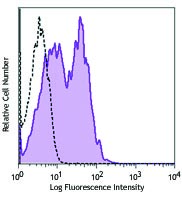
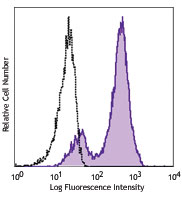
Compare Data Across All Formats
This data display is provided for general comparisons between formats.
Your actual data may vary due to variations in samples, target cells, instruments and their settings, staining conditions, and other factors.
If you need assistance with selecting the best format contact our expert technical support team.
-
Purified anti-human CD120b
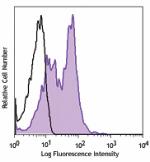
Human peripheral blood lymphocytes were stained with purifie... -
PE anti-human CD120b
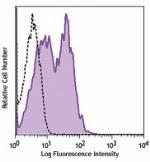
Human peripheral blood lymphocytes were stained with human C... -
APC anti-human CD120b
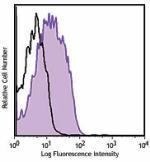
Human peripheral blood lymphocytes were stained with human C... -
Ultra-LEAF™ Purified anti-human CD120b
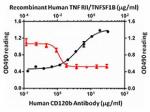
TNF-RII/TNFRSF1B inhibition of TNF-α-induced cytotoxic... -
Biotin anti-human CD120b
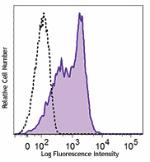
Human peripheral blood lymphocytes were stained with biotiny... -
PE/Cyanine7 anti-human CD120b
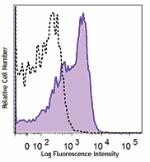
Human peripheral blood lymphocytes were stained with CD120b ... -
PE/Dazzle™ 594 anti-human CD120b
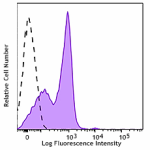
Human peripheral blood lymphocytes were stained with human C... -
TotalSeq™-A1024 anti-human CD120b
-
TotalSeq™-C1024 anti-human CD120b
-
TotalSeq™-D1024 anti-human CD120b Antibody
-
TotalSeq™-B1024 anti-human CD120b






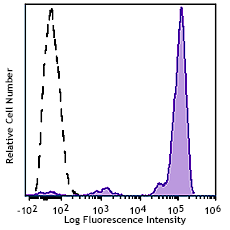
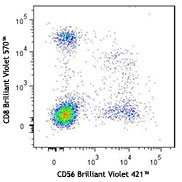



Follow Us